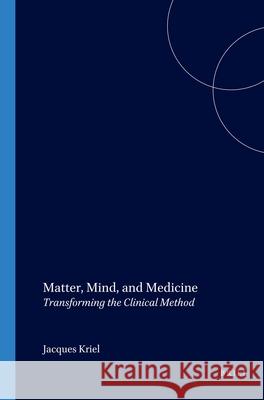Matter, Mind, and Medicine: Transforming the Clinical Method » książka
Matter, Mind, and Medicine: Transforming the Clinical Method
ISBN-13: 9789042007994 / Angielski / Miękka / 2000 / 157 str.
This book critically assesses the implications of modern medicine's claim to be a natural science. Medicine models its scientific and clinical self-understanding on an obsolete positivist conception of science, reality, and consciousness. In this view, the body is modeled as a biological machine, disease as breakdown of the machine, and therapy as physical measures to fix the machine. The problems besetting medical science and practice are rooted in the inadequacy of the positivist philosophical assumptions regarding the nature of science, reality and consciousness To base the diagnostic practices and therapeutic regimes purely on knowledge of physical processes in the human body is, in view of this analysis, at best grossly inadequate, at worst thoroughly dehumanizing (Anton van Niekerk: Editorial Foreword). This means that medicine's clinical method cannot be transformed without transforming the underlying view of science, of reality, and of the human person. The book proposes a broader model of science which overcomes the outdated dichotomy between human and natural sciences. Science is viewed as an interdisciplinary exercise generating multiple perspectives. The insights of the human sciences are essential for scientific clinical medicine. Utilizing evolutionary biology and complexity theory, the author proposes an alternative understanding of reality and human consciousness as a basis for a transformed clinical method. Reality is a hierarchy of systems of increasing complexity. Different levels can be distinguished, namely material systems, living material systems, conscious living material systems and self-conscious living material systems. Each level represents a new manner of being which requires a different scientific discourse of understanding. Using this model of reality the author argues against understanding human consciousness as a byproduct of physical processes in the brain. The human person is a self-conscious, complex, psycho-somatic system, whose well-being is conditioned by much more than physical processes.











